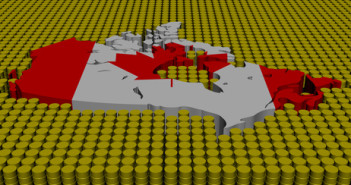A nerve-racking goal-line interception in the last minute of the Super Bowl denied the Seattle Seahawks their quest for a second straight championship, in turn leading to the New England Patriots fourth Super Bowl title. While the Patriots road to the Super Bowl will be marred with controversy surrounding “deflate-gateâ€, the dramatic comeback in last night’s game was indicative of equity price action to begin the trading week.
The overnight Asian session began with sour sentiment permeating throughout equity markets, after purchasing manager activity in China’s manufacturing sector failed to meet expectations, with both the official reading and the HSBC survey showing a contraction in activity from the previous month. The official PMI print was the first contraction since September of 2012, and while a single month of contraction is not yet sufficient to ring alarm bells, it does continue to support our view the Chinese government’s targeting easing plan will remain as the preferred method of controlled stimulus. The disappointing manufacturing numbers were reflected in share prices in regional equity markets, with the Shanghai Comp sliding by 2.53%, while the pessimistic mood filtered through to the Nikkei, which finished its session down by 0.66%.
Sentiment began to make its comeback as European trading got underway, as positive developments out of Greece helped bolster investor confidence. Prime Minister Tsipras helped calm rattled nerves over the weekend by commenting that a debt deal is imminent, and is confident the deal will benefit all parties involved. In addition, statements by an ECB council member aided in the encouraging developments, reassuring markets that the Emergency Liquidity Assistance (ELA) is ultimately up to the ECB’s governing council, so it theoretically could continue to be available to Greek banks if a deal with the IMF and European Union can’t be reached. The follow through of such an action will likely be more rocky in practice than theory, and one would expect the ECB to drive a hard bargain should the ELA be needed in the event a deal can’t be negotiated in a timely fashion.
Turning towards economic developments within the zone, the final PMI manufacturing numbers printed in line with the flash reading of 51.0, with upside surprises from the periphery nations lending support to the downward revisions to the German and French flash readings. Though too early to signal a recovery for the zone is imminent, the absence of a further slide in manufacturing activity from the flash print has helped the euro stage a mini-bounce, with EURUSD aiming to take back the 1.13 handle.
As we get set for the North American open, equity futures are seeing supportive buying interest carry over from the positive developments across the Atlantic, while the greenback has no qualms about resuming its upward trajectory as the DXY marches higher. The early hours of trading in the hydrocarbon complex has been just as gut-wrenching as the final few minutes of yesterday’s Super Bowl, with WTI experiencing a sharp spike on short covering due to Friday’s rig count drop which was the largest since 1987, along with the announcement of a United Steelworks union strike due to disputes over contract renewal that will collectively affect plants that account for more than 10% of US refining capacity. The short covering rally pushed the front-month WTI contract into the mid-$50s in early trading, but the push higher ran into a wall of selling pressure that capped the move and ultimately sent WTI back into the mid-$48s.
The loonie had been able to generate some modest buying interest on the ramp in oil prices, but the dip in USDCAD will likely represent a short-term buying opportunity as monetary policy expectations continue to filter through price action. The domestic data docket for the loonie is fairly light until the latter half of the week, though things start to heat up on Wednesday as participants begin to position around the all-important jobs numbers.
Further reading:
ISM Manufacturing PMI falls to 53.5 – USD down
US Core PCE Price Index slips to 1.3%



